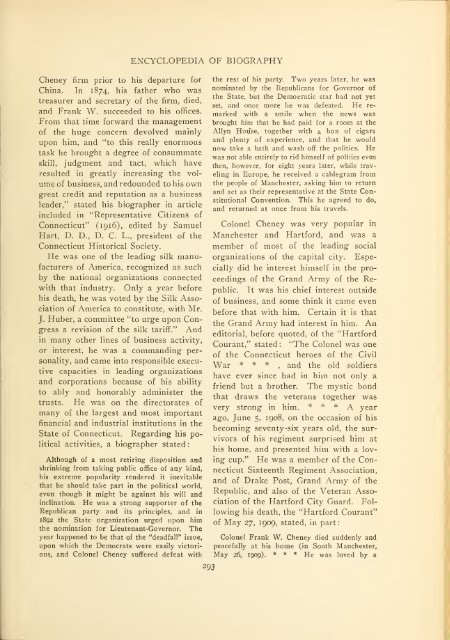Encyclopedia of Connecticut biography, genealogical-memorial ...
Encyclopedia of Connecticut biography, genealogical-memorial ...
Encyclopedia of Connecticut biography, genealogical-memorial ...
Create successful ePaper yourself
Turn your PDF publications into a flip-book with our unique Google optimized e-Paper software.
Cheney firm prior to his departure for<br />
China. In 1874, his father who was<br />
treasurer and secretary <strong>of</strong> the firm, died,<br />
and Frank W. succeeded to his <strong>of</strong>fices.<br />
From that time forward the management<br />
<strong>of</strong> the huge concern devolved mainly<br />
upon him, and "to this really enormous<br />
task he brought a degree <strong>of</strong> consummate<br />
skill, judgment and tact, which have<br />
resulted in greatly increasing the volume<br />
<strong>of</strong> business, and redounded to his own<br />
great credit and reputation as a business<br />
leader," stated his biographer in article<br />
included in "Representative Citizens <strong>of</strong><br />
<strong>Connecticut</strong>" (1916), edited by Samuel<br />
Hart, D. D., D. C. L., president <strong>of</strong> the<br />
<strong>Connecticut</strong> Historical Society.<br />
He was one <strong>of</strong> the leading silk manufacturers<br />
<strong>of</strong> America, recognized as such<br />
by the national organizations connected<br />
with that industry. Only a year before<br />
his death, he was voted by the Silk Association<br />
<strong>of</strong> America to constitute, with Mr.<br />
J. Huber, a committee "to urge upon Congress<br />
a revision <strong>of</strong> the silk tariff." And<br />
in many other lines <strong>of</strong> business activity,<br />
or interest, he was a commanding per-<br />
sonality, and came into responsible execu-<br />
tive capacities in leading organizations<br />
and corporations because <strong>of</strong> his ability<br />
to ably and honorably administer the<br />
trusts. He was on the directorates <strong>of</strong><br />
many <strong>of</strong> the largest and most important<br />
financial and industrial institutions in the<br />
State <strong>of</strong> <strong>Connecticut</strong>. Regarding his po-<br />
litical activities, a biographer stated<br />
Although <strong>of</strong> a most retiring disposition and<br />
shrinking from taking public <strong>of</strong>fice <strong>of</strong> any kind,<br />
his extreme popularity rendered it inevitable<br />
that he should take part in the political world,<br />
even though it might be against his will and<br />
inclination. He was a strong supporter <strong>of</strong> the<br />
Republican party and its principles, and in<br />
1892 the State organization urged upon him<br />
the nomination for Lieutenant-Governor. The<br />
year happened to be that <strong>of</strong> the "deadfall" issue,<br />
upon which the Democrats were easily victori-<br />
ous, and Colonel Cheney suffered defeat with<br />
:<br />
ENCYCLOPEDIA OF BIOGRAPHY<br />
293<br />
the rest <strong>of</strong> his party. Two years later, he was<br />
nominated by the Republicans for Governor <strong>of</strong><br />
the State, but the Democratic star had not yet<br />
set, and once more he was defeated. He remarked<br />
with a smile when the news was<br />
brought him that he had paid for a room at the<br />
Allyn House, together with a box <strong>of</strong> cigars<br />
and plenty <strong>of</strong> experience, and that he would<br />
now take a bath and wash <strong>of</strong>f the politics. He<br />
was not able entirely to rid himself <strong>of</strong> politics even<br />
then, however, for eight years later, while traveling<br />
in Europe, he received a cablegram from<br />
the people <strong>of</strong> Manchester, asking him to return<br />
and act as their representative at the State Con-<br />
stitutional Convention. This he agreed to do,<br />
and returned at once from his travels.<br />
Colonel Cheney was very popular in<br />
Manchester and Hartford, and was a<br />
member <strong>of</strong> most <strong>of</strong> the leading social<br />
organizations <strong>of</strong> the capital city. Espe-<br />
cially did he interest himself in the pro-<br />
ceedings <strong>of</strong> the Grand Army <strong>of</strong> the Re-<br />
public. It was his chief interest outside<br />
<strong>of</strong> business, and some think it came even<br />
before that with him. Certain it is that<br />
the Grand Army had interest in him. An<br />
editorial, before quoted, <strong>of</strong> the "Hartford<br />
Courant," stated : "The Colonel was one<br />
<strong>of</strong> the <strong>Connecticut</strong> heroes <strong>of</strong> the Civil<br />
War * * * , and the old soldiers<br />
have ever since had in him not only a<br />
friend but a brother. The mystic bond<br />
that draws the veterans together was<br />
very strong in him. * * * A year<br />
ago, June 5, 1908, on the occasion <strong>of</strong> his<br />
becoming seventy-six years old, the sur-<br />
vivors <strong>of</strong> his regiment surprised him at<br />
his home, and presented him with a loving<br />
cup." He was a member <strong>of</strong> the Con-<br />
necticut Sixteenth Regiment Association,<br />
and <strong>of</strong> Drake Post, Grand Army <strong>of</strong> the<br />
Republic, and also <strong>of</strong> the Veteran Asso-<br />
ciation <strong>of</strong> the Hartford City Guard. Following<br />
his death, the "Hartford Courant"<br />
<strong>of</strong> May 27, 1909, stated, in part<br />
Colonel Frank W. Cheney died suddenly and<br />
peacefully at his home (in South Manchester,<br />
May 26, 1909). * * * He was loved by a<br />
:

















